‘Wanted: Information on the life of the writer and publisher
Frank Hollings. In particular, where and when did he die?’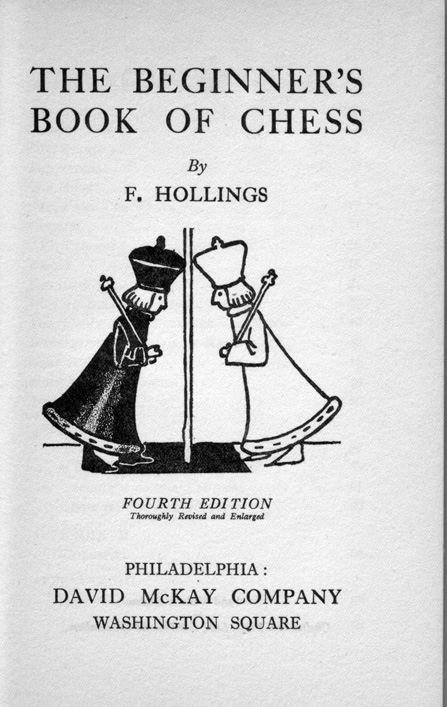
Edward Winter
The following appeared as C.N. 65 (in 1982):
‘Wanted: Information on the life of the writer and publisher Frank Hollings. In particular, where and when did he die?’
Hollings was by no means a negligible figure in chess literature, and his 1921 volume The Beginner’s Book of Chess was described by the BCM (July 1921, page 258) as ‘a very good sixpennyworth, under present day expensive conditions for printing and paper’. Over the decades it went through at least a dozen editions, in the United Kingdom and the United States. The British publisher was Hollings’ own company, whose address, at that time, was 7 Great Turnstile, Lincoln Inn Fields, London WC2. An advertisement on the cover pages of the June 1921 BCM referred to the ‘The House of Hollings’, which was billed as ‘the Mecca of the Chess World’ and ‘The Chief House in Europe for Chess Literature, Ancient and Modern, and for every Chess Requisite’. Exactly how well the Beginner’s Book sold is not known, but the advertisement stated that it was obtainable ‘at any book shop or at any railway book stall in the English-speaking world’; an advertising feature at the back of Znosko-Borovsky’s book Traps on the Chessboard (London, 1938) indicated that 50,000 copies of the Beginner’s Book had been sold. The 11th edition had ‘eightieth thousand’ on the front cover. Among other works published by the Hollings company were Alekhine’s volume on London, 1932.
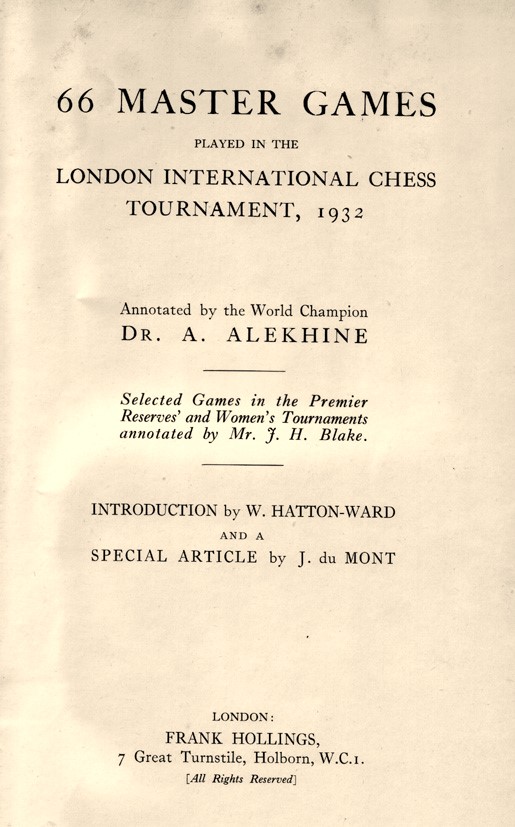
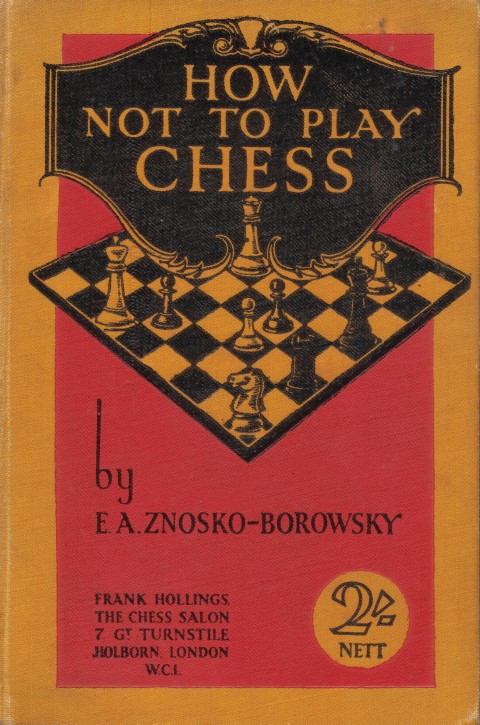
A difficulty facing the researcher is that ‘Frank Hollings’ was often the publishing house/bookshop and not the man himself. In C.N. 763 B.H. Wood informed us:
‘It was no longer Frank Hollings as early as 1935. I went down to chat in my first few weeks with CHESS to find a fellow named, I think, Redman or Redway in charge. I was an even more innocent businessman then than now. Re-emerging after half an hour I suddenly realized I had not learnt a thing but had been pumped dry of information about my own ventures.’
In C.N. 1890 we quoted the following from pages 393-394 of the December 1940 BCM:
‘The sympathy of all chessplayers will go out to Mr Redway, of Frank Hollings, the famous bookshop in Great Turnstile where lovers of chess used to congregate.
As announced in our last issue, the premises were destroyed by enemy action. An H.E. bomb fell in the night, causing a fire, and a good half of the valuable stock was destroyed.
On the same day, Mr Redway’s private residence in Richmond was damaged in another air raid. It took a month to repair it and to make it habitable again, when it was bombed a second time. Mr Redway then went to Bath to recuperate, when his house had a third and final visitation, a remarkable and typical example of thoroughness in the attack on really important military objectives.
We wish Mr Redway a speedy recovery and express our appreciation of his dogged pertinacity in continuing business at 69a Great Queen Street, WC2 (off Kingsway) where his stock of chess books has been replenished in a remarkable manner.’
Even in the mid-1960s the Frank Hollings shop still existed (at 45 Cloth Fair, London EC1). An advertisement on the inside front cover of the British Chess Federation’s Year Book of Chess 1964-1965 indicated, moreover, that The Beginner’s Book of Chess remained in print, over four decades after its first appearance. However, Hollings’ name was no longer on the cover.
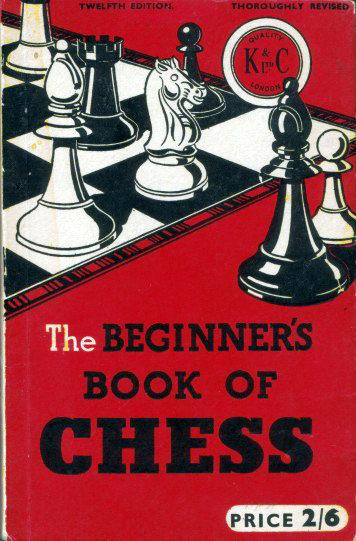
The enterprise was coming to an end. As mentioned in C.N. 726, an advertisement for ‘Frank Hollings The Chess Book Salon’ in the April 1965 BCM stated:
‘Because of staff difficulties we have decided that the Chess department of our bookselling business must be allowed to run down and close ...’
Also in C.N. 726 a reader in Australia, Robert Meadley, drew attention to a biographical article, including a photograph, on pages 480-483 of the December 1901 BCM which announced the imminent departure for New Zealand of ‘Mr Frank Hollins’ of Birmingham.
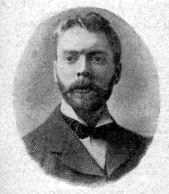
Frank Hollins
A victory by ‘Frank Hollins’ against Jasnogrodsky was given, as well as one, as Black, against A.J. Mackenzie: 1 e4 e5 2 Nc3 Nf6 3 f4 d5 4 fxe5 Nxe4 5 Nf3 Nc6 3 a3 Bc5 7 d4 Nxd4 8 Nxd4 Qh4+ 9 g3 Nxg3 10 Nf3 Bf2+ 11 Kxf2 and ‘Black mates in three’. This was included by Chernev in his book 1000 Best Short Games of Chess. We noted in C.N. 1917 that when it was published on page 17 of the October 1908 Chess Amateur (with no occasion mentioned) Black was named as ‘Frank Hollings’ and that, in any case, the winning combination had already been seen, with colours reversed, in a game won by Michaelsen and published on page 349 of the November 1884 Deutsche Schachzeitung. (See also pages 42-43 of our book on Capablanca.)
In C.N. 1890 Mr Meadley quoted from page 59 of the June 1905 issue of Lasker’s Chess Magazine, which had an item on ‘Chess in New Zealand’: ‘Seven games were submitted to the adjudication of Mr Frank Hollins, of Taranaki, a fine player, formerly of England.’ There followed a game with notes by Hollins taken from a newspaper. Further annotations by ‘F. Hollins, formerly of England’ were published on page 74 of the final issue (December 1908-January 1909) of Lasker’s Chess Magazine. But still nothing exists to suggest that Hollins and Hollings were the same person. In short, the biographical information currently available about Frank Hollings is more or less zero.
(3688)
In C.N. 3688 we wrote regarding The Beginner’s Book of Chess that ‘over the decades it went through at least a dozen editions’. Reconstructing the UK and US publication history with exact dates would seem impossible (and, in any case, unimportant), but we now possess a copy (undated) with ‘fifteenth edition’ on the front cover.
(3702)
W.D. Rubinstein (Aberystwyth, Wales) writes:
‘I looked up “Frank Hollings” in the on-line edition of the recently-published Oxford Dictionary of National Biography, which allows one to find every occurrence of any word or name. In the entry for Richard Herne Shepherd (1840-1895), bibliographer, it is stated that some of his works were published by his brother who “under the name Frank Hollings ran a bookshop in Holborn”, and was also a publisher. The brother’s name is not given but I have noted the following webpage: http://www.howes.co.uk/303-2.htmThis lists a book by Richard Herne Shepherd which is described as follows:
“… the definitive version of Shepherd’s Tennyson bibliography (an earlier attempt appeared in his Tennysoniana, 1879). It was his last publication in an ill-remunerated life of literary hackwork, varied by the occasional piracy, including two editions of The Lover’s Tale. With an inserted advert leaf for Shepherd’s other bibliographies, and for a facsimile of “Mr Thackeray, Mr Yates and the Garrick Club”, which was itself to be forged in due course. The publisher of these was Frank Hollings; he was born James Francis Hollingshead Shepherd, younger brother of R.H.S. and it is just possible that he may have been involved with the forgers …”’
Professor Rubinstein’s discovery of this reference to Frank Hollings’ real name being James Francis Hollingshead Shepherd is of much interest. Now the hunt must start for information about him in chess literature of the late nineteenth century and the first few decades of the twentieth, as well as, of course, in general reference sources.
(3706)
Brad Dassat (Oldham, England) draws attention to two websites:
and
http://www.bertramrota.co.uk/catalogues.htm [link no longer working]
The first states, inter alia:
‘R.H. Shepherd, Bibliography of Tennyson (1896), page 9; hereafter cited as Shepherd. There is a peculiar difficulty connected with the book. In his preface the editor wrote, “Four or five years ago ... declining health necessitated his [Shepherd’s] retirement from active life, and in a retreat at Camberwell his last days were spent in compiling for Notes and Queries a bibliography of Coleridge, and in preparing for the press a bibliography of Tennyson.” He had retired to the residence of his brother, James Francis Hollings Shepherd, at “Fern Bank”, 35 Broomhouse Road, Fulham, but he died on 15 July 1895, of cancer of the testis and liver, in the Camberwell House Lunatic Asylum. His brother, who had set up in 1892 as a bookdealer under the name of Frank Hollings, published and no doubt edited the posthumous bibliography of Tennyson.’
For its part, the second webpage includes the following:
‘Dusty Miller, who died on 31 January [1977], was 71. He started his bookselling career in 1925 at the age of 20 at Frank Hollings of Great Turnstile, High Holborn. The shop was blitzed during the war and the business moved to Great Queen Street, and subsequently to Cloth Fair near Smithfield.
When Dusty joined Hollings the proprietor was W.E. Redway, and on his death Dusty Miller bought the business on favourable terms from Mrs Redway (who, incidentally, lived to be 102). Dusty worked at Hollings until 1969, when he sold the business to Bertram Rota Ltd., but continued bookselling from Sutton, Surrey, for another five years, and at the same time acted as a consultant to Rota’s.’
(3709)
Harrie Grondijs (Rijswijk, the Netherlands) submits this letter:
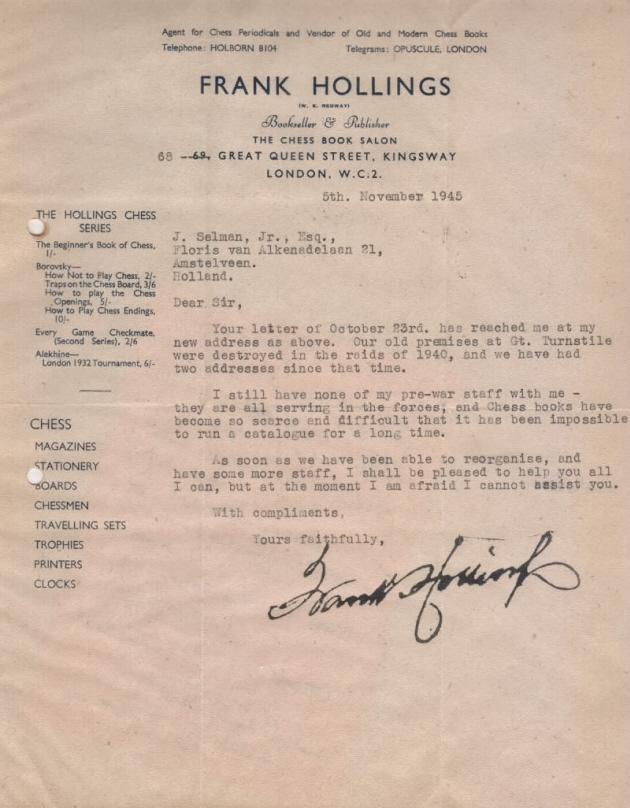
Can it really be that the Frank Hollings was still alive and working in 1945?
(6955)
Adam Douglas (London) writes:
‘Frank Hollings was the trading name of William Edward Redway (1866-1945), the second proprietor of the Frank Hollings bookshop.
There never was a real “Frank Hollings”. The antiquarian bookshop was started in 1892 by James Francis Hollings Shepherd (born 1844), the younger brother of the eccentric writer and bibliographer Richard Herne Shepherd. James Shepherd used his two middle names to create an alternative trading name for his bookshop, as he was already in trade under his real name as a silversmith, having founded the firm Saunders & Shepherd (with Cornelius Desormeaux Saunders) in 1869. From 1873 to 1902 their silver business was conducted at Bartlett’s Passage, Holborn Circus. As the Saunders Shepherd Group, the business continues to this day.
Shepherd opened the Frank Hollings bookshop in 1892, a few hundred yards west of his silversmith premises at 7 Great Turnstile, High Holborn. He also published single author bibliographies under that name, beginning with Buxton Forman’s bibliography of William Morris (1897) and followed by three more, including his brother’s of Coleridge. The last book published by Frank Hollings in its first incarnation was Prideaux’s bibliography of Robert Louis Stevenson, in 1903.
Two of Redway’s brothers, George William Redway (1859-1934) and Frank Albert Redway (1876-1916), were also booksellers and occasional publishers. George Redway ran an occult bookshop at 15 York Street, Covent Garden, where his books were for a time catalogued by the writer Arthur Machen. His youngest brother Frank was a bed-ridden invalid, who nevertheless operated as a bookseller in Wimbledon. George Redway knew Richard Herne Shepherd well – he wrote his obituary notice for The Athenaeum – and also his younger brother James, the proprietor of the Frank Hollings bookshop, two and a half miles away from his own. James died in about 1905, and the Redway family was well placed to make an early offer to buy the business as a going concern.
When William Edward Redway took over the shop after Shepherd’s death, he completely changed the whole tenor of the business. Gone were the expensive author-bibliographies aimed at wealthy Edwardian book collectors, to be replaced by a stream of publications on chess, beginning in 1908 with the first of three parts of The Series of First Class Games edited by the Hungarian-born chessplayer and journalist Leopold Hoffer. Redway was the chess enthusiast solely responsible for the association of the Frank Hollings name with the game.
Redway kept the business going through the Second World War, when the bookshop was blitzed (his own Richmond house was bombed the same day), and he moved the business to 69a Great Queen Street, WC2, off Kingsway. After his death in 1945, his widow continued the business for a couple of years before selling it to its third and last proprietor, Arthur T. (“Dusty”) Miller, who had worked in the bookshop since 1925.
Miller relocated the shop to 45 Cloth Fair, near Smithfield. His interests were literary, and in 1965 he announced that the chess department was to close. Soon afterwards he sold up altogether, and the long-established bookshop of Frank Hollings ceased trading in 1969. Dusty Miller took his remaining stock, expertise and contacts to the modern rare booksellers Bertram Rota, where he sat in the office as a reminder of the old order until his death in 1977.
Both George and Frank Redway became innocently tangled up with the notorious book forger Thomas J. Wise. A good deal of biographical information about them can be gleaned from a short book about the Wise affair, The Firm of Charles Ottley, Landon & Co: Footnote to an Enquiry by John Carter and Graham Pollard (London, 1948).’
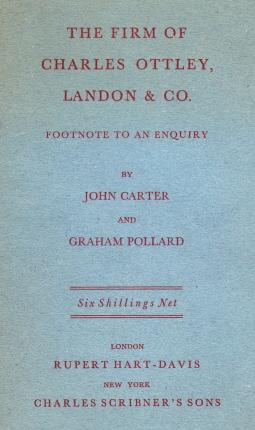
(7591)
Addition on 21 February 2023:
John Townsend (Wokingham, England) writes:
‘There is strong evidence that the date of death of James Francis Hollings Shepherd was 2 June 1925 (rather than “about 1905”, as stated by Adam Douglas). My source for that date is the National Probate Calendar for 1925, which shows that his will was proved on 10 November 1925; his wife, Ellen Maria Shepherd, was a beneficiary, as were Walter Scott Shepherd and Mary Wakefield Shepherd. The date of death is corroborated by the General Register Office’s index of deaths, which has an entry in the registration district of Wandsworth (Volume 1d, page 584) in the second quarter of 1925, his age given as 81.
Shepherd’s birth entry is recorded in the third quarter of 1844 in the registration district of Chelsea (Volume 3, page 57), and his marriage, also in Chelsea, to Ellen Maria Wakefield, in the last quarter of 1886 (Volume 1a, page 658).
His father, Samuel, was a fellow of the Society of Antiquaries, for some time resident in Marlborough Square, Chelsea, where James F.H.S. and his other children were born. Samuel had written a work on the history of Chelsea which illness prevented him from seeing published, and his eldest son, Richard Herne Shepherd, produced an article about it for Walford’s Antiquarian Magazine and Bibliographical Review, edited by G.W. Redway, Volume XI, January to June 1887, pages 255-256. According to the article, the Chelsea work would have been dedicated to James Francis Hollings, of Leicester, a scholar and author and “an old and cherished friend” who was the godfather of Samuel’s second surviving son. It seems likely that the Frank Hollings book business was named after him as a mark of the Shepherd family’s esteem.
In the various census returns up to and including 1911, J.F.H.S. was never referred to as a bookseller, but as a manufacturing jeweller, or similar. William Edward Redway was described in 1901 as a “bookseller’s assistant” and in 1911, when he was living at Great Turnstile, as an “assistant bookseller”. Redway seems not to have been the proprietor of Frank Hollings at this stage, though he was clearly working on the premises in 1911.’
To the Chess Notes main page.
To the Archives for other feature articles.
Copyright: Edward Winter. All rights reserved.